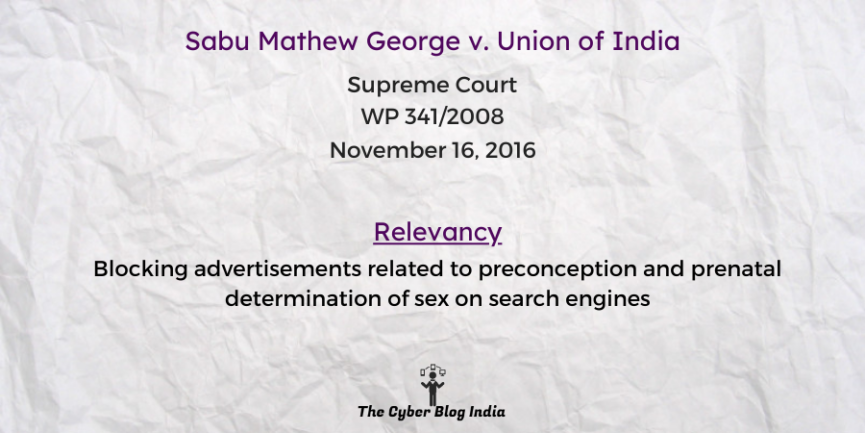Sabu Mathew George v. Union of India (November 2016)

Sabu Mathew George v. Union of India
(2017) 2 SCC 514
In the Supreme Court of India
WP 341/2008
Before Justice Dipak Misra and Justice Amitava Roy
Decided on November 16, 2016
Relevancy of the case: Blocking advertisements related to preconception and prenatal determination of sex on search engines
Statutes and Provisions Involved
- The Information Technology Act, 2000 (Section 79(1))
- The Pre-Conception and Pre-Natal Diagnostic Techniques Act, 1994 (Section 22)
- The Constitution of India, 1950 (Article 19(2))
Relevant Facts of the Case
- The Central Government had to file an affidavit on whether or not it is possible to control respondents 3, 4, and 5 (Google, Microsoft, and Yahoo) to not show anything that violates the Indian law.
- The Central Government asked seven questions to the companies regarding compliance with the Pre-Conception and Pre-Natal Diagnostic Techniques Act (PC-PNDT Act). They agreed to block the auto-fill feature for keywords related to sex selection.
- The companies agreed to develop a technique so that it is not shown if it violates Section 22 of the PC-PNDT Act, whenever an advertisement or search is introduced. It was to be done through the auto-block technique.
Prominent Arguments by the Advocates
- The petitioner’s counsel argued that the Union of India should ensure that the companies fully obey the law. Further, advertisements regarding the foetus are still appearing.
- The respondents’ counsels submitted a proposed list of keywords for the auto-block feature. Further, they submitted that if someone submits something which contravenes the PC-PNDT Act, it will be blocked using the auto-block feature. But, as intermediaries, they will do so only when someone notifies them about the same. Freedom of access to information includes access to information of any nature unless it violates Section 22 of the PC-PNDT
- Google’s counsel argued that Section 22 of the PC-PNDT Act is only limited to advertisements in a commercial sense. Further, Section 79(1) of the IT Act, 2ooo was amended by the Information Technology (Amendment) Act, 2008, which the Apex Court read down in Shreya Singhal v. Union of India. Thus, it is constitutionally valid.
Opinion of the Bench
- The intermediaries shall be obliged to apply the auto-block feature within a reasonable time, and not only when someone notifies about it.
- Freedom of access to information cannot violate the laws of the land.
- It is debatable whether companies can hide under the freedom to access information or be catalysts in the depletion of the sex ratio.
- As an interim measure, the Union of India shall constitute a nodal agency, and advertise that if anyone comes across an advertisement related to sex selection, they should notify them of the same.
- On being notified, the intermediaries shall delete it within 36 hours and notify the Nodal Agency.
Final Decision
- Matter listed for final disposal on 16.02.2017.
